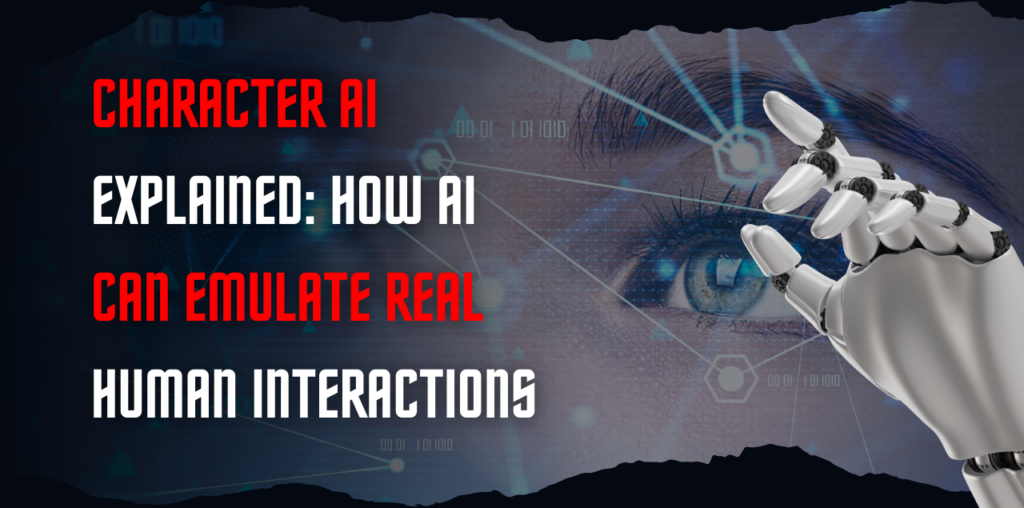Character AI, a term growing popular in the tech world, represents a transformative technology where AI-driven virtual entities embody unique personalities, emotions, and communication styles. These AI models aren’t just about solving problems or delivering factual information; they are designed to feel human, engaging users with distinct characters that create more immersive and personal experiences. This blend of personality and intelligence gives Character AI its appeal and usefulness, revolutionizing industries ranging from customer service to education and entertainment.
In this article, we’ll explore what Character AI is, how it works, its diverse applications, and how it’s shaping the future of digital interaction. We’ll also touch upon resources like the AI tools directory for research, which can guide you in selecting the best AI tools available.
- Defining Character AI: The Next Level of Conversational AI
Character AI is a subset of artificial intelligence focused on building digital personalities that can engage, understand, and empathize with humans on a more personal level. Unlike traditional AI models, which may deliver straightforward, utility-based responses, Character AI goes further to emulate the nuances of human personality, such as humor, empathy, and individual quirks.
By programming AI with personality traits, developers can build characters that feel realistic and relatable. This added dimension of personality significantly enhances the user experience, providing a sense of human interaction that’s especially beneficial in applications like customer service, therapy, and entertainment.
- The Technology Behind Character AI: A Peek Under the Hood
Character AI integrates several advanced technologies to deliver its unique capabilities:
Natural Language Processing (NLP): Allows the AI to understand and generate human language, ensuring fluent and contextually relevant responses.
Machine Learning Algorithms: Continuously learn from interactions, helping the character AI evolve and adapt to user preferences.
Emotion Recognition and Response: Recognizes emotions in text and responds accordingly, creating an empathetic and engaging experience.
Behavioral Modeling: Adds personality traits, like humor or formality, making the character distinct and memorable.
This sophisticated blend of technology enables Character AI to transcend basic responses, providing users with meaningful interactions.
- How Character AI Differs from Traditional Chatbots
Standard chatbots are designed to answer questions and complete tasks efficiently. Character AI, however, is designed to do so with personality and a conversational style that makes the interaction memorable. The key differences include:
Personality-Driven Interactions: Character AI can be configured with specific traits, so users might interact with a funny, friendly AI or a formal, knowledgeable assistant.
Emotional Intelligence: These AI models can recognize and respond to emotional cues, making interactions feel personal.
Dynamic Learning: While basic chatbots stick to pre-scripted responses, Character AI learns from interactions, adapting its responses over time.
- Key Benefits of Character AI Across Different Industries
Character AI’s unique attributes offer numerous advantages across sectors:
Customer Support: By engaging customers with personality, Character AI can reduce frustration and provide a warmer, more supportive customer experience.
Education: Character AI can serve as a tutor with a unique personality, encouraging students to engage and learn.
Healthcare and Therapy: In therapeutic settings, an empathetic Character AI can offer support and encouragement, potentially aiding mental health professionals.
Entertainment: Character AI can create interactive characters for games, simulations, and storytelling, enhancing user immersion.
Each of these benefits highlights how Character AI extends beyond task-oriented functionality to provide a human touch in digital interactions.
- Character AI in Action: Popular Use Cases and Applications
The applications of Character AI are vast, covering both business and entertainment needs. Here’s a look at a few of the most impactful uses:
Virtual Companions: Character AI has found a place in companionship apps, where users can converse with AI-driven personalities for casual conversation, emotional support, or as a digital friend.
Interactive Gaming Characters: In gaming, AI-powered characters can make gameplay feel more realistic by interacting with players based on the storyline, player’s actions, and personality traits embedded in the AI.
Personalized Learning Assistants: In educational tech, Character AI acts as personalized tutors, adapting to students’ learning styles and offering a motivating, conversational teaching style.
Customer Service Avatars: Brands can now deploy Character AI-powered chatbots that not only solve customer issues but also maintain brand voice and personality.
- Character AI vs. Human Interaction: Can AI Truly Replace Human Connections?
One question often posed is whether Character AI can substitute for genuine human connection. While Character AI can mimic empathy and recall user information to make interactions personal, there are still limitations:
Depth of Understanding: While AI can recognize emotions, its understanding is algorithm-based and not genuine.
Complex Situations: For complex issues requiring nuanced human insight, AI might fall short.
Emotional Limitations: Character AI lacks true empathy, making it a great complement to, but not a replacement for, real human interaction.
Despite these limitations, Character AI excels in enhancing user experience and is a powerful tool for automating social interactions in a more humanized way.
- Integrating Character AI into Business: Key Steps for Success
For businesses interested in using Character AI, here’s a streamlined approach:
Define Personality and Tone: Decide on traits that align with your brand.
Select the Right AI Tools: Use an AI tools directory for research to find the best Character AI solution.
Optimize and Train the Model: Customize responses to fit your audience and continually improve the character’s behavior based on user feedback.
Test Interactions: Conduct user testing to ensure the AI resonates with users as intended.
- Exploring the AI Tools Directory for Research
The AI tools directory for research is an invaluable resource for those interested in Character AI. These directories compile comprehensive lists of available tools, categorized by purpose, features, and user reviews. Here’s how they can help:
Tool Comparison: The AI tools directory enables easy comparisons to find the ideal tool for creating a custom Character AI.
User Reviews: Direct insights from other users can guide you to the most effective and user-friendly options.
Feature Exploration: By examining key features, businesses can select tools with advanced customization for personality, emotion recognition, and dynamic learning.
Directories like these streamline the search for Character AI solutions, allowing users to find the best tool for their needs.
- Common Challenges in Developing Character AI
Developing Character AI can present several challenges:
Ensuring Realistic Personality Traits: Crafting a character that feels genuine requires careful personality programming and nuanced interactions.
Balancing Personality with Task Efficiency: It’s essential to create an AI that entertains without distracting from its primary task.
Handling Complex Emotions: Understanding and responding to complex emotions like frustration or sadness is still a hurdle for AI developers.
Overcoming these challenges is crucial for creating engaging Character AI that truly enhances user experience.
- The Future of Character AI: What’s Next?
As Character AI continues to develop, several exciting advancements are on the horizon:
Enhanced Emotional Intelligence: Improvements in emotion recognition will allow Character AI to engage users in even deeper, more nuanced ways.
Advanced Behavioral Modeling: Future models may include even more complex personality traits, making AI interactions feel genuinely unique.
More Realistic Virtual Companions: As AI advances, Character AI could become even closer to mimicking real human interactions, especially in therapeutic and educational applications.
- Ethical Considerations in Character AI
Character AI raises some ethical questions, such as privacy, consent, and emotional manipulation. Developers must ensure that users are aware they’re interacting with an AI and that personal information is handled responsibly.
- How to Get Started with Character AI: Key Tools and Resources
To dive into Character AI, consider leveraging resources like AI tools directory for research for the best tools and platforms. Look for solutions that provide:
Custom Personality Configurations: Allow you to define specific character traits.
Comprehensive Data Security: Protects user privacy and maintains trust.
User-Friendly Interfaces: Ensures that developers and end-users can navigate easily.
Conclusion
Character AI represents an exciting frontier in artificial intelligence, allowing digital entities to communicate in a way that feels genuinely human. With applications spanning customer service, education, healthcare, and entertainment, Character AI has the potential to reshape how we interact with technology daily. By exploring tools through an AI tools directory for research and understanding the technology’s capabilities, you can harness Character AI’s potential to create meaningful, engaging user experiences.
FAQs
What is Character AI?
Character AI refers to AI models designed to engage users with distinct personalities and communication styles, mimicking human interaction.
How does Character AI work?
Character AI combines NLP, machine learning, and behavioral modeling to deliver personalized, personality-driven conversations.
What are common uses of Character AI?
It’s widely used in customer support, educational tools, virtual companions, and gaming for interactive character development.
Can Character AI replace human interaction?
No, while Character AI offers engaging interactions, it lacks genuine human empathy and understanding.
Where can I find the best Character AI tools?
Use an AI tools directory for research to discover tools based on user reviews, features, and application areas.



